|
Limitar tu búsqueda
[+–] Compilador o editor
[+–] Editorial
[+–] Fecha
[+–] Formato
[+–] Idioma
[+–] Tipo de documento
[+–] Tipo de recurso
|

|
|
Los retos de la seguridad social en América Latina
Uno de los mayores retos que enfrentamos al abordar el tema de la seguridad social es el de proveer a los trabajadores una pensión digna, aquella donde el trabajador logre al menos lo básico de la canasta básica familiar, al terminar su vida laboral.
Conferencia pronunciada en el Curso "Evolución, Realidad y Perspectivas de los Regímenes de Pensiones" celebrado en el CIESS del 16 de julio al...
|

|
|
|
|

|
|
Book review. Violence and social orders: a conceptual framework for interpreting recorded human history, by Douglas C. North, John Joseph Wallis, and Barry R. Weingast
Why societies differ in their level of violence? This is the question addressed by North, Wallis, and Weingast. To provide an answer they must develop a rich theory of how individuals and organizations that compose a human group voluntarily surrender their will to act violently in exchange for participating in a society with improved conditions for the creation and conservation of wealth.
|
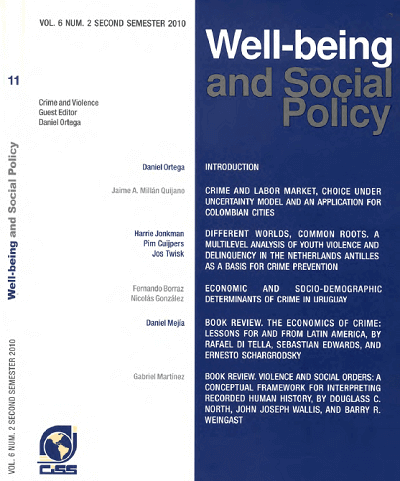
|
|
|
|

|
|
The health insurance reform in the Netherlands and its relevance for Mexico
Alrededor del mundo se observan dos versiones de la organización de los seguros de salud; la seguridad social basada en el empleo, y los servicios nacionales de salud. En Latinoamérica regularmente se usa la primera, pero se está lejos de lograr la cobertura universal. En los Países Bajos encontramos una peculiar mezcla de obligaciones públicas y responsabilidades privadas. La cobertura universal...
|
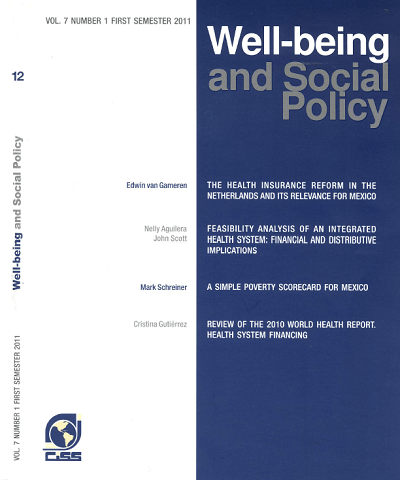
|
|
|
|

|
|
Evolución de las reformas de los seguros sociales
En nuestros días, el antiguo Estado de Bienestar —con las nuevas tendencias políticas y económicas— difícilmente puede afrontar los desafíos sociales. El exceso de control social mediante la intervención del Estado ya no se acepta; se reduce su capacidad de actuar en asuntos sociales. El Estado deja de ser aceptado como sistema político-administrativo que decide y gestiona las medidas y los...
|

|
|
|
|

|
|
Book review. Beyond survival. Protecting households from health shocks in Latina America, by Baeza, Cristian C., y Truman G. Packard
The book by Cristian Baeza and Truman Packard is based on the next hypothesis: adverse health events reduce the consumption of goods and services different from health services, and many households become poor because of that. While the authors recognize that the evidence they present on the topic is limited, they propose the use of a “universal risk pool” as a way to eliminate the problem of...
|
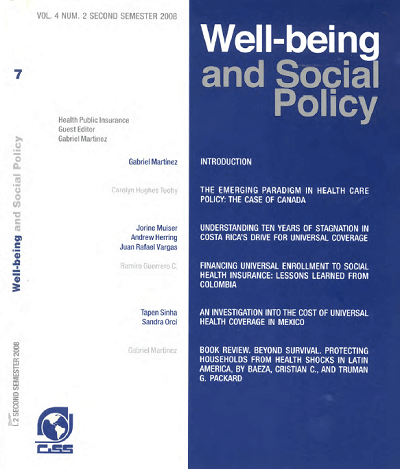
|
|
|
|

|
|
La dignidad y la solidaridad como principios rectores del diseño y aplicación de la legislación en materia de seguridad social
Conferencia dictada en el Diplomado: "Seguridad Social. Desafío, Transición y Prospectiva", realizado por el CIESS del 30 de octubre al 1º de diciembre de 2000.
|

|
|
|
|

|
|
Democracy and universality: debating the conditions of applying such concepts to Brazil's public health actions and services
This paper reviews the determinants and conditionalities of the process of universalizing public health in developed countries, notably the European ones, and in Brazil, and is aimed at highlighting their differences. The first part discloses the main interpretations on the constructing of the Welfare State, emphasizing the characteristics of that historical moment and its articulation with...
|
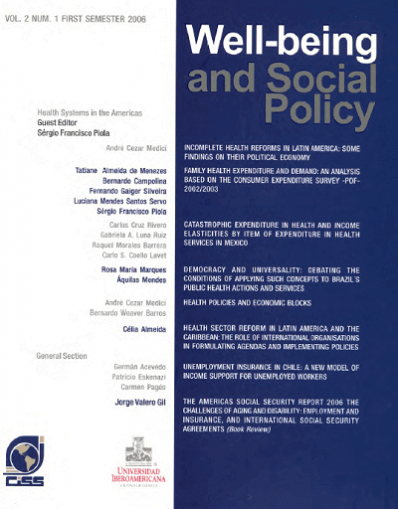
|
|
|
|

|
|
Unemployment insurance in Chile: a new model of income support for unemployed workers
This paper describes the Chilean experience concerning the implementation of a new unemployment insurance (UI) program. The use of individual savings accounts and private management are essential elements. In addition, a redistributive fund (Common Fund) helps workers pool risks, distributing resources from employed to unemployed workers and from stable firms to workers with low incomes and...
|
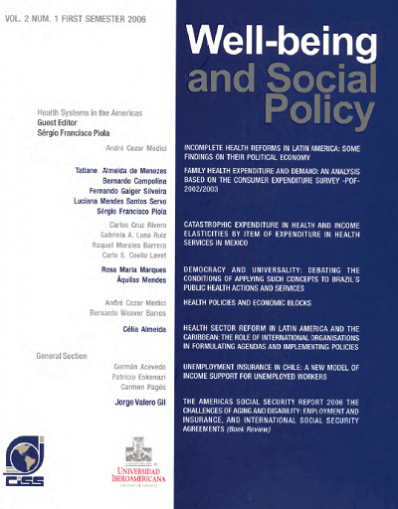
|
|
|
|

|
|
Social security and inequality in Mexico: from polarization to universality
The article documents the failure of social security in Mexico as an instrument of social protection and evaluates possible reform strategies. It analyses the truncated coverage of these systems for the most vulnerable, the regressive incidence and horizontal inequities of public social security subsidies, and the consequences for old-age poverty and inequalities in basic health opportunities. It...
|
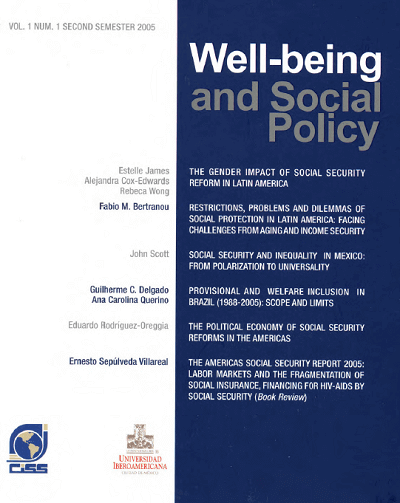
|
|
|
|

|
|
Provisional and welfare inclusion in Brazil (1988-2005): scope and limits
This paper analyses the influence of new rights derived from the Social Security System in Brazil after the Federal Constitution (1988). At least, three different and independent forces determinate the arrangements in social security policies: 1) the new social rights created by constitutional rules in response to social pressure; 2) the decrease of employment and wages in salaried jobs imposed...
|
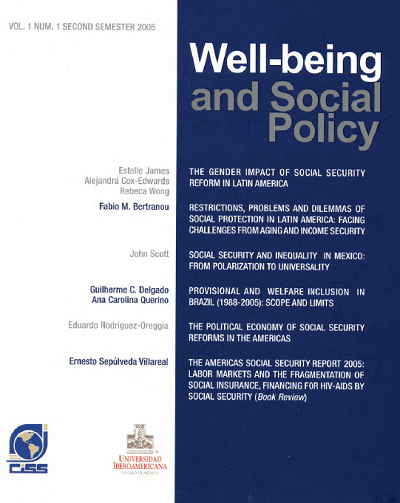
|
|
|
|

|
|
The political economy of social security reforms in the Americas
This paper analyses the factors affecting the decision to apply a reform (parametric and structural) in the Americas, which may hold a specific set of conditions, i.e. a sui generis political system and a high degree of economic openness, among others. Economic freedom is relevant in the case of structural reforms, while results for the share of older population are not conclusive. It may be that...
|
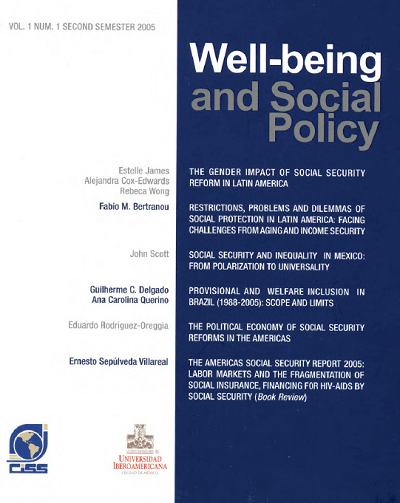
|
|
|
|

|
|
The Americas Social Security Report 2005: labor markets and the fragmentation of social insurance, financing for HIV-AIDS by social security (Book review)
The Americas Social Security Report 2005, published by the CISS, gathers the contributions, opinions, and comments of more than 30 social security specialists from different countries in the American continent, as well as the review of the most recent literature on this matter. The purpose is to present, to specialized public and to laymen, a detailed, analytic, and updated report of the...
|
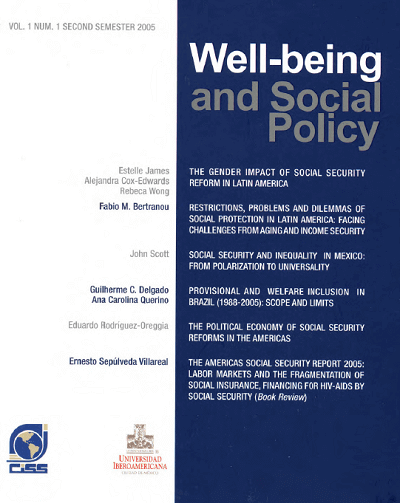
|
|
|
|

|
|
Incomplete health reforms in Latin America: some findings on their political economy
This paper raises the point that only few health reforms implemented in Latin American countries modified the existing health systems in order to fix the problems brought by the institutional fragmentation typical of this sector. A great part of these reforms did not implemented the necessary measures to improve coordination among health systems in the prevailing pluralistic model and besides,...
|
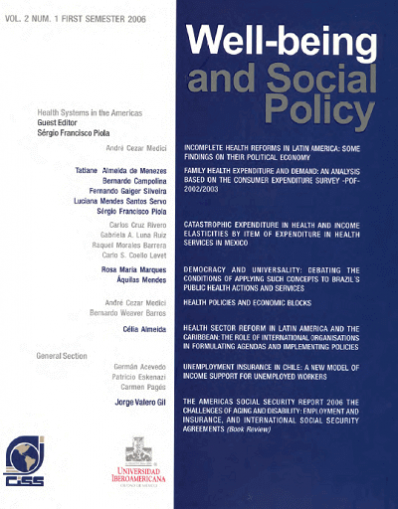
|
|
|
|

|
|
Family health expanditure and demand: an analysis based on the consumer expenditure survey - POF - 2002/2003
This paper aims at analyzing healthcare expenditure and demand of families, by estimating income-elasticity and price-elasticity for ten groups of products using the so-called model Linear Almost Ideal Demand System (LAIDS). The 2002/03 consumer expenditure surveys (POF) of the Fundação Instituto Brasileiro de Geografia e Estatística – FIBGE (Brazilian census bureau) are used, providing extremely...
|
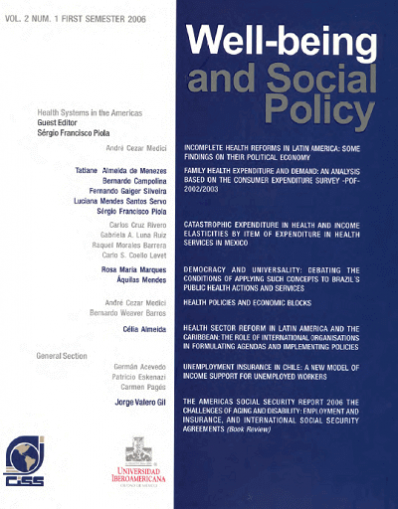
|
|
|
|

|
|
Catastrophic expenditure in health and income elasticities by item of expenditure in health services in Mexico
The objective of this article is to put in economic perspective the expenditure in health within the pattern of family expenditure of the Mexican households. Information of the National Survey on Income Expenditure of Households (ENIGH) of Mexico of 2004 is analyzed on: structure of the expenditure of the households, expenditure in health and income-expenditure elasticities in health; by...
|
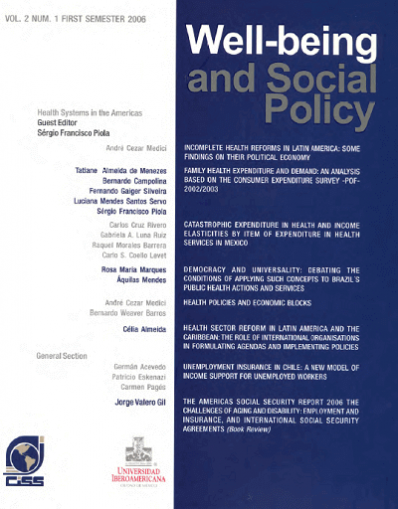
|
|
|
|

|
|
Review of International migration, remitances, and the brain drain, edited by Çaglar Özden y Maurice Schiff
As the volume title suggests, three of the studies deal with the effects of remittances on incomes and measures of well-being, four address various aspects of highly skilled migration, while the remaining paper examines the determinants of migration from rural Mexico to the US. Each of these is certainly topical: the rise in reported global remittance flows has been a major spur to the recent...
|
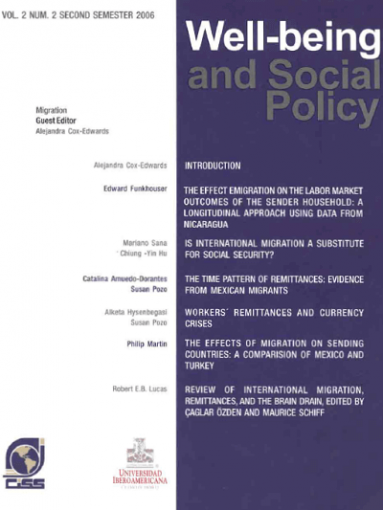
|
|
|
|

|
|
Restrictions, problems and dilemmas of social provision in Latin America: facing challenges from aging and income inequality
This paper discusses the main restrictions, problems and dilemmas that social provision faces in Latin America in a context of demographic changes and low achievements in the economic performance, particularly in the labor market. It is proposed the need to adapt the general social provision matrix as function of priorities and restrictions set by financing access. Due to the limited labor...
|
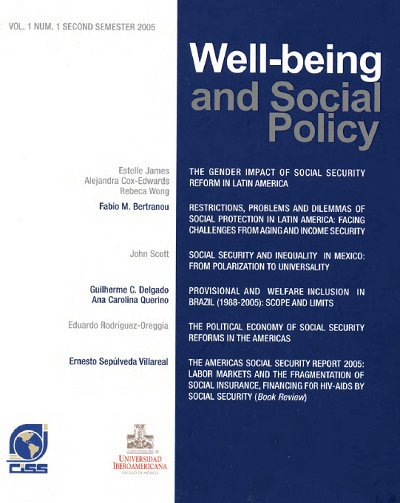
|
|
|
|

|
|
The effects of migration on sending countries: a comparison of Mexico and Turkey
International migrants are persons who cross national borders and remain outside their countries of birth or citizenship for 12 months or more, regardless of the reason for being abroad or legal status while abroad. According to UN estimates, the number of international migrants was 191 million in 2005, and half were in the labor force of the destination country. International labor migration...
|
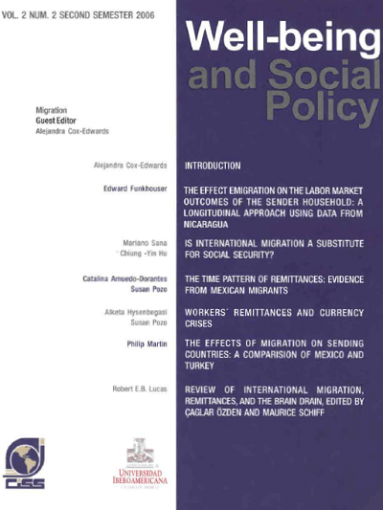
|
|
|
|

|
|
Workers' remittances and currency crises
We seek to further understand the factors that determine per emigrant remittances using data from 23 Latin American and Caribbean countries over the 1980-2003 period. We find that emigrants avoid remitting when the exchange rate is under pressure. This finding is consistent with the notion that remitters strive to reduce their exposure to exchange rate losses by taking into account the expected...
|
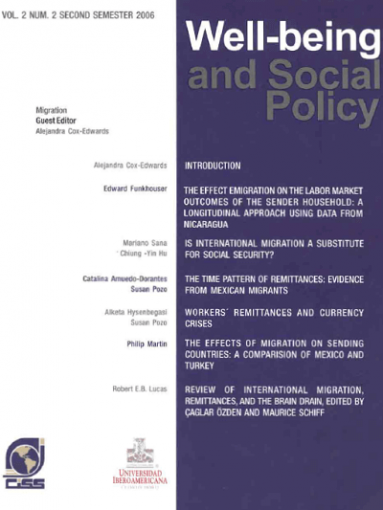
|
|
|
|

|
|
The time pattern of remittances: evidence from mexican migrants
We explore the time pattern of remittances using data on return migrants from the Mexican Migration Project. Some of these return migrants have settled in the U.S. and are returning to Mexico to visit family and friends, whereas others are temporary migrants returning home after a working spell in the U.S. We find that the dollar amount remitted first increases with time spent in the U.S. to...
|
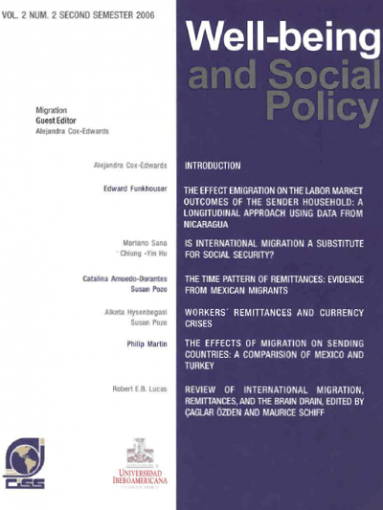
|
|
|
|
|